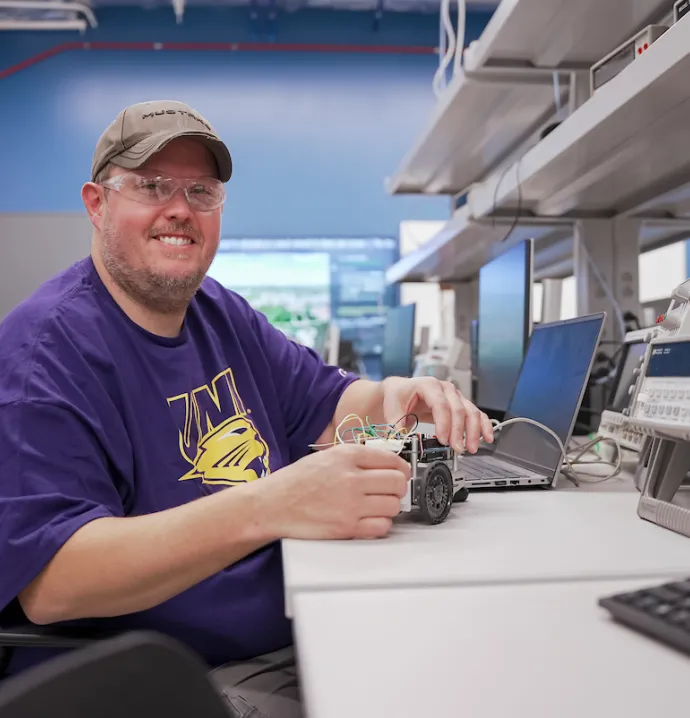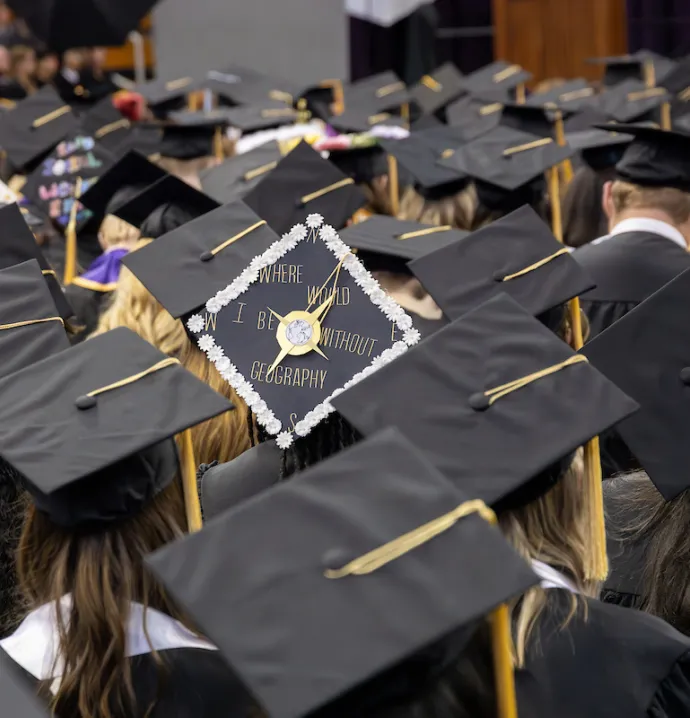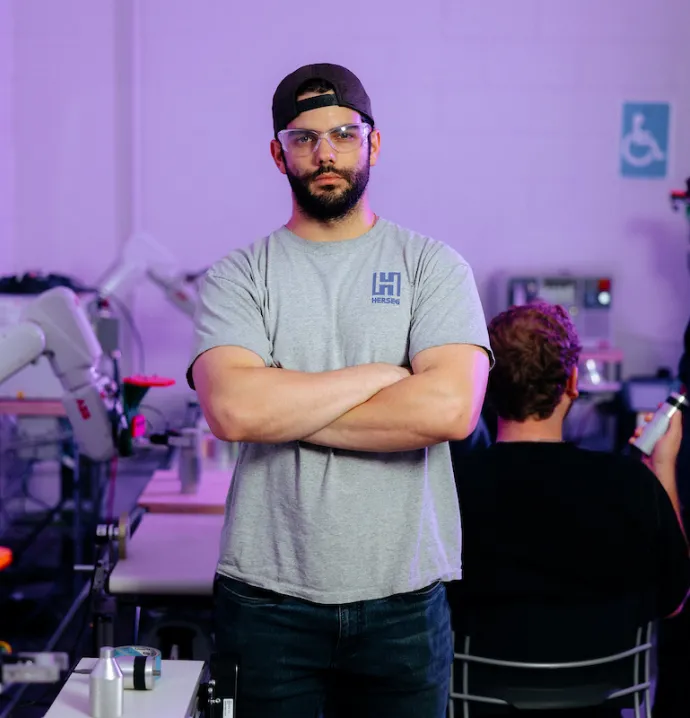UNI AmeriCorps program combats COVID-19 while fighting for environment
UNI AmeriCorps program combats COVID-19 while fighting for environment
The empty gallon milk jug landed with a thwack as it slapped against the placid surface of a stretch of Dry Run Creek near the Cedar Falls Visitor Center.
The jug, used to capture a sample of water for quality testing, was attached to a string held by University of Northern Iowa junior Logan Gray. He was perched about 15 feet above the creek on a trail bridge, struggling to propel the buoyant plastic container through the stubborn surface tension of the Cedar River tributary.
Gray was working on one of the many environmental stewardship projects planned by UNI’s Green Iowa AmeriCorps, the largest environmental AmeriCorps project in Iowa. During the summer months, more than 100 service members across the state will plant trees, remove invasive species, clean rivers and much more, while gaining valuable experience contributing to the overall health and sustainability of the state.
“The goal has always been to be a leading environmental steward in our communities and in Iowa, and we’ve been fortunate to do that for a long period of time,” said Ashley Craft, who has been the director for Green Iowa AmeriCorps for almost 10 years.
The water sample Gray, an environmental sciences major, collected is part of a complex statewide system of testing Green Iowa AmeriCorps is using to help track water quality, looking for local variations that could cause cascading environmental issues.
“Everything that happens in smaller creeks turns into something bigger,” he said. “The creek connects to the river that connects to the ocean. You have to start from the source of the issues.”
But water quality testing is only the tip of the iceberg for the program. In a normal summer, Green Iowa AmeriCorps works with over 20 agencies in 12 counties throughout the states, from government entities to nonprofits to schools. Services typically focus on three areas: residential energy efficiency, land restoration and water quality testing, and sustainability efforts in K-12 schools. In a normal year, full-time Americorp staff spend months planning projects focused on these areas for the more than 60 people they hire to carry them out in the summer.
But this summer is not normal. Like almost every other aspect of society, the coronavirus has upended these months of planning.
“Most of that planning is out the window,” said Carmen Finken, Green Iowa AmeriCorps program manager. “It will be unlike anything that we’ve ever experienced before with the program. But we’re fortunate that the university is still up and running and getting all these people employed.”
The abrupt onset of COVID-19 has led to a sharp pivot for Finken and her team, who have spent long hours developing community support projects on the fly to help marshall the state through the crisis.
“We’re thinking of it beyond the environmental and energy focus and getting back to the roots of AmeriCorps, which is rooted in national service,” Finken said. “Our members' services are becoming more centered around coronavirus response and community engagement. There is still a strong environmental stewardship element, but our members are really responding to the call for leadership across the entire state.”
Members are helping serve communities by delivering meals to home-bound seniors, packaging meals at local food banks and pantries, answering calls at crisis centers, assisting with childcare for first responders, and creating and distributing face masks.
Although AmeriCorps programs exist across the country, UNI’s Green Iowa AmeriCorps, through the leadership of Craft, Finken and Johnson, has been a source of inspiration and encouragement for its members, said Hannah Luce, a UNI junior studying leisure, youth and human services who was promoted to summer projects coordinator after the spring semester.
“Everyone in that building is incredibly kind and supportive. The work culture is incredible,” Luce said. “That’s something that’s unique to this program. They want me to succeed and support me in my life goals. They’ve been great role models for me and how I want to live my life. It’s going to be sad when I graduate.”
The shift in focus resulted in several new programs and initiatives AmeriCorps members will carry out this summer.
The Backyard Steward Initiative will provide services to install vegetable and pollinator gardens free of charge to residents in the Cedar Valley as part of an ongoing effort to address issues of food insecurity. Participants in the program will receive a site visit from AmeriCorps members, who will assess the space, light, soil moisture and other conditions while planning which vegetables and/or pollinators the owner’s desires.
AmeriCorps members throughout the state will be leading an online summer camp throughout the entire month of July. Lessons will be centered around recycling, composting, gardening, native Iowa habitats and climate change. The camp will be geared toward upper elementary-aged students
Since normal audit and weatherization services have been put on hold, Green Iowa AmeriCorps is developing the Audit in a Box program, which will use a series of YouTube videos educating residents how to perform their own energy audits. Participants will complete a form that identifies what kind of energy efficiency improvement their home needs, such as lights, shower heads and more, and an AmeriCorp member will deliver those items to their doorstep.
“COVID-19 threw all of us through a loop, but the thing that’s been exciting is how flexible and resilient our program can be,” Craft said. “We’re still serving as an essential hub in our communities.”
And while this summer has changed, one thing that has remained the same is the value of the AmeriCorps experience.
“The beauty of AmeriCorps is it’s an introduction to a professional job, but it comes with the grace of being new to a position,” said Lauren Johnson, Green Iowa AmeriCorps program manager. “It’s such a foundational experience for them professionally. They’re not afraid to make mistakes. We’re in a team setting so teamwork, problem solving and taking on leadership roles are critical for them.”
And pursuing a career in the environmental field is not required to serve in the program. UNI senior Aubruy Lewis is studying psychology, but was drawn to AmeriCorps for the service component.
“I just really want to help people and another way to do that is to help the environment,” Lewis said.
On a recent weekday , Gray collected his water sample and carried the plastic jug down to Tamathy Stage, land and water steward for Green Iowa AmeriCorps, who was waiting to perform a slate of water quality tests with Lewis and graduate student Natalie Ita.
For the students, it was their day to learn the ropes of water quality testing, and Stage guided them through the many tests Green Iowa AmeriCorps uses to evaluate local water. As joggers and bikers passed by, the group huddled on the trail to test for nitrates, phosphorus, temperature, clarity, dissolved oxygen and more.
The data was gathered and added to the reams of measurements already in the books from the years the Land & Water Stewards, a separate Green Iowa program, have worked to restore, improve and preserve Iowa's natural landscapes and resources.
These problems encompass local issues, including high water temperatures that make life difficult for fish to high chloride concentration from snow and ice melt that can create habitat issues.
But the tests also have global implications. High levels of nitrate in the water from fertilizer runoff is one of Iowa’s top water quality issues, Stage said, and the impacts can reach the Gulf of Mexico, where it co-mingles with run-off from other areas in the Mississippi River Basin to create concentrations of low oxygen in the gulf that are deadly to some species. Known as the “dead zone,” this area can reach up to 7,000 squares miles in the summer.
“With the data, we can figure out the solutions and see where the root of these problems are and solve it from there,” Stage said. “Unless someone’s out here looking at the water and taking measurements, these problems can’t get properly diagnosed.”




